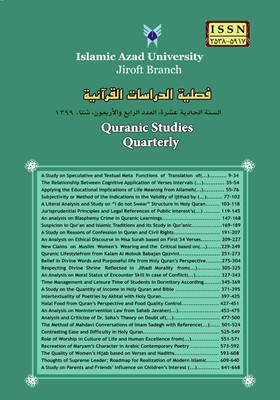Contrasting Ease and Difficulty in Holy Quran
Subject Areas : Quarterly Sabzevaran FadakMohammad Ali Kazemi Tabar 1 , Hossein Bazoodar Ghavi 2
1 - استادیار گروه الهیات دانشگاه فرهنگیان
2 - daneshkade tarbiyat modarres mashhad
Keywords: قرآن, Contrast, semantics, Quran, Meaning, تقابل, معناشناختی, سیاق, اعجاز بلاغی, rhetorical miracle,
Abstract :
the aim of the present study is to study the semantics of the contrast between the words Ease and Difficulty in the Holy Quran; Because in addition to vocabulary sources, one of the best ways to know the meaning of words is to apply them semantically opposed to each other. Another way is to use the context of the verses before and after. Sometimes, from the context or meaning of the opposite word, meanings of a word are understood that are not found in any dictionary. At the same time, there is a semantic similarity between the understood meaning and the root principle of the word. The more we understand the meanings of the verses, the more we will enjoy the meanings of the verses of the Qur'an and the better we will benefit from the verses of God in our material and spiritual life. One of the most important results of this research is to realize the semantic beauties of Quranic verses along with more accurate knowledge of the meaning of these two words, familiarity with the two methods and their use, and that whenever God first mentions Yasir and then expresses difficulty, it is a kind of warning. Has given and whenever difficulty has preceded ease, it has promised and hoped that the difficulty will be removed and the opening will be achieved.
قرآن کریم.
ابن القیم الجوزیه، محمد بن ابی بکر. 1387ش، التبیان فی اقسام القرآن، قم: مؤسسه فرهنگی و اطلاع رسانی تبیان.
ابن سینا، حسین بن عبدالله. ۱۳۷۶ش، الالهیّات من کتاب الشّفاء، قم: بی نا.
ابن منظور، محمد بن مکرم. 1414ق، لسان العرب، بیروت: دار الفکر للطباعة والنشر والتوزیع.
ابنعباس، عبدالله بن عباس. 1413ق، غریب القرآن فى شعر العرب، بیروت: مؤسسة الکتب الثقافیة.
امین، نصرتبیگم. بی تا، مخزن العرفان در علوم قرآن، بی جا: بی نا.
جوادی آملی، عبدالله. 1393ش، تسنیم، قم: انتشارات اسراء.
راغب اصفهانی، حسین بن محمد. 1412ق، مفردات الفاظ قرآن، بیروت: دار الشامیة.
زرکشی، محمد بن بهادر.1410ق، البرهان فى علوم القرآن، بیروت: دار المعرفة.
زمخشری، محمود. 1407ق، الکشاف عن حقائق غوامض التنزیل، بیروت: دار الکتاب العربی.
سیوطی، عبدالرحمن بن ابیبکر. 1421ق، الإتقان فی علوم القرآن، بیروت: دار الکتاب العربی.
شوکانی، محمد. 1414ق، فتح القدیر، دمشق: دار ابن کثیر.
شیخ حر عاملی، محمد بن حسن. 1409ق، وسائل الشیعه، قم: مؤسسة آل البیت علیهم السلام.
طباطبائی، محمدحسین. ۱۳۶۲ش، نهایة الحکمة، قم: موسسه نشر اسلامی.
طباطبایی، محمدحسین. 1374ش، تفسیر المیزان، ترجمه محمد باقر موسوی همدانی، قم: دفتر انتشارات اسلامی.
طبرسی، فضل بن حسن. 1372ش، مجمع البیان فی تفسیر القرآن، تهران: انتشارات ناصرخسرو.
طبرسی، فضل بن حسن. 1412ق. جوامع الجوامع، قم: حوزه علمیه قم، مرکز مدیریت.
طوسی، محمد بن الحسن. 1407ق، تهذیب الاحکام،تهران: دار الکتب الإسلامیه.
فخر رازی، محمد بن عمر. ۱۴۱۰ش، المباحث المشرقیة فی علم الالهیات والطبیعیات، بیروت: چاپ محمد معتصم باللّه بغدادی.
کریستال، دیوید. 2003م، دیکشنری از زبانشناسی و آوایی، آکسفورد: انتشارات بلکول.
مصطفوی، حسن، 1368ش، التحقیق فی کلمات القرآن الکریم، تهران: وزارت فرهنگ و ارشاد اسلامی.
نصیرالدین طوسی، محمد بن محمد. ۱۳۶۱ش، اساس الاقتباس، تهران: چاپ مدرس رضوی.
هاشمی، احمد. 1381ش، جواهر البلاغه، قم: حوزه علمیه، مرکز مدیریت.
_||_
Holy Quran
Ibn al-Qaim al-Jawziyah. Mohammad ibn Abi Bakr, 2008, Al-Tebyan al-Qur'an, Qom: Tebyan Cultural and Information Institute.
Ibn Sina, Hossein ibn Abdullah. 1997, Al-Hilayat Man Book al-Shafa, Qom: Print by Hassan Hassanzadeh Amoli.
Ibn Abbas, Abdullah bin Abbas. 1413 AH, Gharib al-Qur'an in Al-Arab Poetry, Beirut: Institution of Al-.Qa'afafi
Ibn al-Mutaq, Muhammad ibn Makram. 1414 AH, Lesan al-Arab, Beirut: The eloquent and eloquent .and eloquent thinker
Amen, let's say Nosrat. [Bihar], the repository of the mystics in the Qur'an, [Bihar]: [Bihar
Javadi Amoli, Abdullah. 2014, Tasnim, Qom: Esra Publication.Raghab Esfahani, Hussein bin Mohammad. 1412 AH, Singularities of the Qur'an, Beirut: Dar al-Shami
Zarqashi, Muhammad bin Bahador.1410 AH, al-Burhan al-Qur'an, Beirut: Dar al-Marafi.
Life, Mahmoud. 1407 AH, Diswearing the Truthful Taznazil Truths, Beirut: Al-Arabi Books
Suwaiti, Abdul Rahman ibn Abi Bakr. 1421 AH, Examining the Quranic Sciences, Beirut: Dar al-Arab Book.
Sheikh Har Aghani, Mohammad bin Hassan. 1409 AH, Al-Shi'ite Properties, Qom: Al-Bayt Institute of Islam.
Shokani, Muhammad. 1414 AH, Fatah al-Qadir, Damascus, Dar Ibn Kathir
Tabatabai, Mohammad Hossein. 1995, Tafsir al-Mizan, translation by Mohammad Bagher Mousavi .Hamdani, Qom: Islamic Publications Office
Tabrizi, Fazl bin Hassan. 1372, The Assembly of Al-Biyan Fi Tafsir al-Quran, Tehran: Nasser Khosrow Publications.
Tabrizi, Fazl bin Hassan. 1412 AH Communities of Qom, Qom: Qom Seminary, Management Center
Tusi, Muhammad bin al-Hasan. 1407 AH, Tazibat al-Ahkam, Tehran: Dar al-Islam al-Islam.
Fakhrazi, Muhammad bin Omar. 1410 AH, Al-Masharqiyah al-Mashriyat al-Fayyat al-Tayyibiyyat, Beirut: Printed by Mohammad Motasem Balla Baghdadi.
Tabatabai, Mohammad Hossein. 1362, The final al-Hikmah, Qom: Institute of Islamic Publishing.
Mostafou, Hassan, 1368, Al-Karim Al-Qur'an Research, Tehran: Ministry of Islamic Culture and Guidance.
Nasir al-Din Tusi, Mohammed bin Mohammed. 1361 AD, Base of al-Katbbas, Tehran: Printed by Modarres Razavi.
Hashemi, Ahmed. 2002, Jawahar-e-Balagheh, Qom: Seminary, Management Center.
Crystal, David. 2003, Dictionary of Linguistics and Phonetics, Oxford: Blackwell Publishing


